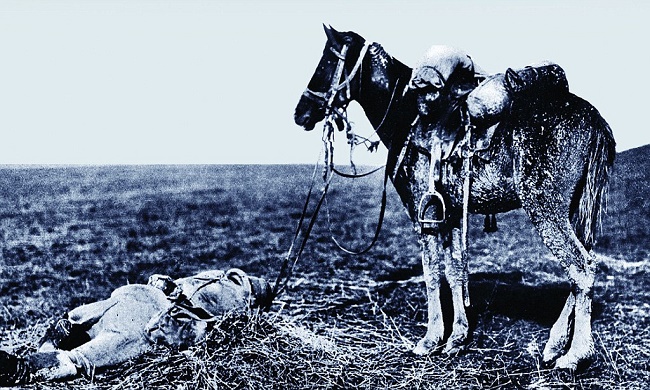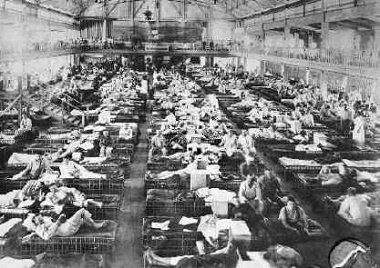|
Greater love ...

On Monday the 25th of April, remember with
sadness the many men and women who served their country in
the great war, particularly the 63,000 of Australia's
finest young men and women who went to an early grave.
Remember the families left to grieve. All
they were left with were memories of their children's
childhood and youth, a few photos - and a memorial in the main street.
Australia's best deserved to grow old and die
at home, and not in Turkey, Syria or France.

Hold the torch high.
In Flanders fields the poppies blow
Between the crosses, row on row,
That mark our place; and in the sky
The larks, still bravely singing, fly
Scarce heard amid the guns below.
We are the Dead. Short days ago
We lived, felt dawn, saw sunset glow,
Loved and were loved, and now we lie
In Flanders fields.
Take up our quarrel with the foe:
To you from failing hands we throw
The torch; be yours to hold it high.
If ye break faith with us who die
We shall not sleep, though poppies grow
In Flanders fields.
John McCrae (1915)
On January 28, 1918, while still commanding
No. 3 Canadian General Hospital (McGill) at Boulogne, McCrae
died of pneumonia with "extensive pneumococcus meningitis".
He was buried the following day in the Commonwealth War
Graves Commission section of Wimereux Cemetery, just a
couple of kilometres up the coast from Boulogne, with full
military honours. His flag-draped coffin was borne on a gun
carriage and the mourners – who included Sir Arthur Currie
and many of McCrae's friends and staff – were preceded by
McCrae's charger, "Bonfire", with McCrae's boots reversed in
the stirrups. Bonfire was with McCrae from Valcartier,
Quebec until his death and was much loved.
In memory
of Robert Peter HENLEY
(1884 - 1937) – the grandfather I never knew, who died before his
time.
Military
Service: Regular Army 1908-16; Staff Sgt. 3rd Casualty
Clearing Station, Australian Army 1916-19.
|
'Trains ran into the little siding loaded with
wounded from the Somme battlefields. The weather was terrible
and the mud near the line so bad that many came in for treatment
literally covered from head to foot . . . Sometimes 3 and 4 trains
per day with loads of 200-400 cases.
. . . In
December the sick began to come in numbers - trench foot,
rheumatism, pneumonia.'
At 10.30 pm the
Gothas were over and bombed a lot of men; many were killed. At
11.30 pm the wounded began to arrive. The three C.C.S.s took it in
turn to admit batches of 50 each. |
 |
I was in
charge of the Resuscitation ward, with two splendid orderlies.
Torrents of rain were falling, and poor fellows were carried in,
saturated and covered in mud, stone cold and pulseless. Three primus stoves
provided our hot water supply. Many of our patients died as we
lifted them from the stretchers. By midnight, the ward was full of
groaning wrecks. I was appalled by the immensity of the task before
us. At the faintest sign of a pulse beat, we were injecting salines
and working like mad to get the patient to the operating table.
Friday, 17 August.
The hospital was fuller than ever of dying men. All day and night
they poured in. Troops came up in their thousands, past the
hospital, singing with brave gaiety as they marched to death,
disappearing amid the never-ending thunder and lightning of the
guns. As fast as they went up, they - or what was left of them -
would be brought back in all sorts of frightful conditions. We
worked night after night, in the din of raging battles; dressed and
bandaged the wounded; comforted them; praised their courage, their
grit and strength of will. The atmosphere reeked with the mingled
odours of blood and humanity, antiseptic and gas.
No. 3 A.C.C.S. was
included in the first echelon of a northern group (behind II Corps)
with Nos. 2 Canadian and 10 British – a distinguished company – and
during the next two months, with wounded and the first wave of
influenza, had a very strenuous time. It was made a special centre
for the severer type of influenza, which began to occur in June,
just before the first wave subsided. Of a total of 1,893 admissions
in August, 1,177 were for sickness, and it was observed that, while
the number of patients diagnosed - influenza - decreased, the
duration of the disability and death rate from bronchopneumonia was
on the increase.
Poperinghe 4 October
1917. Patients began to arrive at 11 am, and in the first
twenty-four hours about three thousand patients passed through our
C.C.S.
The work in the
Resuscitation ward was indescribable. The butchery of these
precious lives - men of such splendid physique! To watch them dying
in such numbers was ghastly. Their frightful condition was
appalling: clothes saturated; faces caked with mud; the conscious
ones smiling grimly, glad to be wounded and out of it.
Mary Tilton:
The Grey Battalion - (State Library of Victoria catalogue
no. 940.4)
With
thanks to my brother Ted for tracking down this information.
Lest we
forget.
John Miller
|


